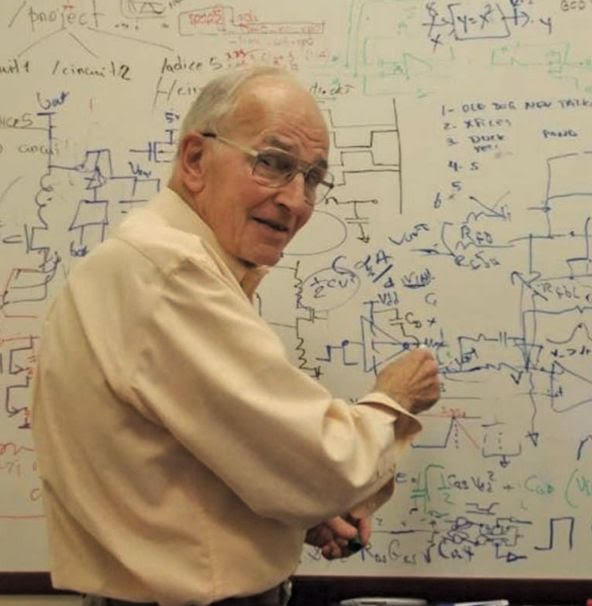
Paul Brokaw (1935 – 2025)
Paul Brokaw, one of the all-time greats of the analog IC business, died at the age of 90 on September 18 at his home in Tucson, AZ.
Most people knew Paul as the creator of the ubiquitous bandgap voltage reference which bore his name, but that one circuit does not begin to capture the extent of his contribution. He was a prolific and breathtakingly creative circuit designer with countless successful products and patents to his credit. According to the Engineering and Technology History Wiki (ETHW), he created many of the foundational integrated circuit topologies employed over the last four decades in successful semiconductor devices and helped establish an entire philosophy of analog circuit design. His work was integral to the analog transition from bipolar to CMOS technologies. His contributions to analog-to-digital and digital-to-analog converters pushed the level of precision available in integrated converters with innovations that improved the matching accuracy of scaled reference currents over a wide dynamic range and temperature range, leading to best-selling products from Analog Devices, Inc.
Even more important to many of us around the world was Paul’s role as mentor. He was a pivotal influence in so many of our lives. We will miss his guidance, razor sharp wit, and contagious love of circuit design.
An Analog Devices Fellow and IEEE Life Fellow, he received the IEEE Donald O. Pederson Solid-State Circuits Award in 2021 for leadership in the design of voltage references, amplifiers, and power management, and for contributions to the principles of analog circuit design. In 2018, with assistance from the IEEE Foundation and thanks to a generous philanthropic donation from Paul and his family, IEEE established the Brokaw Award for Circuit Elegance in his name.
No finer testament to Paul’s influence can be found than the two special issues of IEEE Solid-State Circuits Magazine dedicated to the man and his work which were published during his lifetime: Summer-2013 and Winter-2021. A chat in which he shares his lifelong fascination with electricity and circuits and discusses the beauty and satisfaction of discovering simple yet effective circuit designs, can be viewed on SSCS’s YouTube channel.
–Chris Mangelsdorf with contributions from SSCS staff
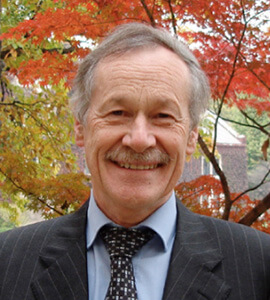
Willy Sansen (1943 – 2024)
Willy Sansen, former president of the IEEE Solid-State Circuits Society (SSCS) and a luminary in analog integrated-circuit design research and education for the last 50 years, passed away on April 24, 2024.
A Life Fellow of IEEE, Dr. Sansen received his Ph.D. degree from the University of California, Berkeley in 1972. He became a full professor at KU Leuven, Belgium, in 1980. From 1984 to 2008, he headed the Microelectronics and Sensors laboratory, Department of Electrical Engineering, KU Leuven, focused on analog design. In 2002 he became the first European program chair of the IEEE International Solid-State Circuits Conference, and was the first European president of the IEEE Solid-State Circuits Society from 2008–2009. He received the Donald O. Pederson Solid-State Circuits Award in 2011 for leadership in analog integrated circuit design. He supervised 65 Ph.D. theses and (co)authored more than 650 papers and 16 books, including the slide-based book Analog Design Essentials (Springer, 2006.)
SSCS offers its condolences to those who knew and loved Dr. Sansen, and expresses its gratitude for his contributions to our vision of fostering innovation and excellence in solid-state circuits for the benefit of humanity.

Emeritus Kenneth C. Smith (1932 – 2023)
Emeritus Kenneth C. (‘K.C.’) Smith (EngPhys 5T4, ECE MASc 5T6, PhD 6T0), died on October 29, 2023 at the age of 91, as one of the most well-known and beloved engineering educators.
Along with co-author Professor Emeritus Adel Sedra (ECE), Smith wrote the undergraduate textbook Microelectronic Circuits, known among generations of students simply as ‘Sedra/Smith’. Now in its 8th edition and translated into many languages, this iconic textbook has sold over a million copies since its first publication in 1982 and influenced learners—including most EngSci students—for over 40 years.
The book was revolutionary when it was published as it took a new approach to teaching what was (and remains) a rapidly developing technology. “This textbook dives right into useful applications of amplifiers before expounding on the details of the constituent transistors, allowing students to understand and experiment with interesting applications of microelectronics right away,” ”, says ECE Professor Tony Chan Carusone (EngSci 9T7, ECE PhD 0T2), who worked with Smith and Sedra to create the 8th edition. “I recall K.C. once giving an inspiring summary about how electrical engineers traverse many levels of abstraction to handle the tremendous complexity of modern electronic systems. This extremely valuable concept is deeply embedded into the book.”
SSCS offers its condolences to those who knew and loved Professor Smith, and expresses its gratitude for his contributions to our vision of fostering innovation and excellence in solid-state circuits for the benefit of humanity.

Kenneth R. Laker (1946 – 2023)
Former IEEE President Kenneth R. Laker died on August 2, 2023. He was an IEEE Life Fellow and a Professor of Electrical Engineering at the University of Pennsylvania for over 30 years. Professor Laker made a significant and long-lasting impact on IEEE. In addition to his tenure as IEEE President, which he chronicled in a 2011 IEEE Solid-State Circuits Magazine article, he was a longtime member of the Solid-State Circuits Society and the Circuits and Systems Society, serving as CASS president in 1983. He also served IEEE as a Section Chair, Division Director, and Vice President of Educational Activities.
Professor Laker was an equally successful researcher and engineer with seminal contributions in the areas of multi-loop feedback active-RC filters, parasitic-insensitive active-SC filters, and SAW filters.
More information about Professor Laker’s personal and professional achievements can be found on the Engineering and Technology History Wiki, and on this memorial page.
Visitation will take place at the Fitzgerald Sommer Funeral Home, 17 S. Delaware Ave., Yardley, PA, On Thursday, August 10, from 3-7 p.m. EDT. A mass will be held at St.Ignatius Loyola Church, 980 Park Avenue at 84th Street, on Friday, August 11, at 11 a.m. EDT. Interment will be at Gate of Heaven Cemetery, Stevens Ave., Hawthorne, NY, on Friday. August 11 at 1 p.m. EDT.
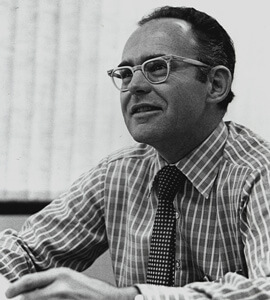
Gordon Moore (1929 – 2023)
Gordon Moore passed away on March 24, 2023, at the age of 94. On behalf of the entire Solid-State Circuits Community, I would like to express our sympathy to the Moore family and close colleagues. Gordon Moore was a co-founder of Fairchild Semiconductor and Intel Corporation, and former chairman of Intel. He was also an active philanthropist and the originator of “Moore’s Law.” Dr. Moore was influential in the creation of the Solid-State Circuits Council (the forerunner of SSCS) and served as the Council’s second president. Many of us remember his plenary talk at the 50th anniversary of the ISSCC in 2003.
In 1965, decades before the personal computer revolution, Moore wrote an article in Electronics Magazine that predicted silicon IC technology would create “home computers … automatic controls for automobiles, and personal portable communications”. He also observed that the cost benefits of monolithic integration were improving at an exponential rate. The number of transistors on a silicon chip had doubled every year since ICs were invented a few years earlier, and Gordon predicted this trend continuing into the future. His insights gave engineers and managers a goal, and it pushed our industry to make his predictions come true.
Gordon Moore predicted a pace of change driven by human ingenuity as well as the rules of physics.
Dr. Moore was surprised by the longevity of his vision, and that his observation became such a large part of his legacy. He commented once in an interview, “It’s amazing how often I run across a reference to Moore’s Law.” “In fact, I googled Moore’s Law and I googled Murphy’s Law. Moore beats Murphy by at least two to one.”
Numerous tributes have been published documenting Dr. Moore’s career in the media and online:
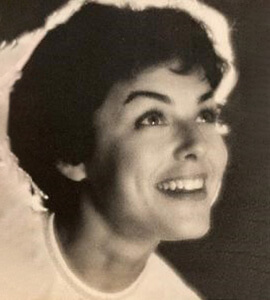
Katherine Olstein (1942 – 2023)
Katherine Olstein (nee Bruder), an accomplished scholar and loving mother and grandmother, died peacefully on Feb. 7 in her home in Highland Park, N.J. She was 80 years old. Katherine served as News Editor of the IEEE Solid-State Circuits Magazine and was instrumental to that publication’s launch; she also was a Senior Society Administrator at the Solid-State Circuits Society from 2005 to 2015. She is remembered by staff and volunteers as an extraordinary, wonderful, and joyful individual. A full memorial article from her local newspaper can be found here.
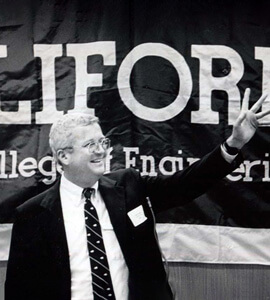
David Hodges (1937 – 2022)
David A. Hodges, a former dean of UC Berkeley’s College of Engineering and an active IEEE, Solid-State Circuits Council, and Solid-State Circuits Society (SSCS) volunteer, passed away on November 13, 2022.
Professor Hodges served as Chairman of the Solid-State Circuits Council, which preceded SSCS, in 1975, and was SSCS Treasurer from 1998-2004. He also served as IEEE’s Vice President of Publications, Chair of the IEEE Awards Board, and was the founding editor of IEEE Transactions on Semiconductor Manufacturing and editor of the IEEE Journal of Solid-State Circuits. In conferences, he was largely responsible for moving the International Solid-State Circuits Conference from Philadelphia to San Francisco. He was elected a Fellow of the IEEE and awarded the IEEE Education Medal.
Read more about his life and accomplishments here.
A memorial ceremony will be held in Berkeley on Saturday, February 18, 2023 at 1 PM PST in the Faculty Club at UC Berkeley. The RSVP link can be found here.

Ninoslav Stojadinović (1950 – 2020)
Ninoslav Stojadinović, a friend of many, passed away on December 25, 2020, after one month of fight with Covid-19. Ninoslav, for friends Nino, was a chairman of many conferences, editor of many scientific journals, well-known and famous professor, a highly respected mentor to his students, and a role model for colleagues.
Ninoslav D. Stojadinović was born in Niš on 20 September 1950 (father Dobrivoje Stojadinović and mother Nadežda Đorđević). He was married to Anđelka with whom he had a son Dragan. He spent most of his student and working life at the Faculty of Electronic Engineering, University of Niš, Serbia. It was at this university where he obtained all his degrees, B.S. (1974), M.S. (1977), and Ph.D. (1980), all in Electrical Engineering. He started first professional job in “Ei-Semiconductors” in Niš in 1974, joined the Faculty of Electronic Engineering in 1976, where he became Full Professor in 1991. He was Head of the Department of Microelectronics (1984-2005), Vice-Dean (1986-1989), and Dean of the Faculty of Electronic Engineering in Niš (1989-1994). He was Vice-Director of SASA Research Center at the University of Niš from 1991-1996. Based on his versatile scientific and teaching work, as well as the achieved results, he became an Academician at the Department of Technical Sciences of the Serbian Academy of Sciences and Arts (SASA, corresponding member from October 30, 2003; full member from November 1, 2012). He was President of the SASA branch in Niš from 2016-2020.
Ninoslav Stojadinović was a member of commissions for promotion of teaching staff at Griffith University (Australia), Brown University (USA), National Technical University of Athens (Greece), Technical University of Sofia (Bulgaria), and Banaras Hindu University (India). In 1997 he was a visiting professor at the Technical University of Wien. Under his supervision 48 Dipl. Ing. theses, 13 M.Sc. theses, and 17 Ph.D. theses were realised. Since 1990 he was a member of the Editorial Board of Microelectronics Journal (Elsevier), while from 1993-1995 he was Editor-in-Chief of this very journal. From 1993-1996 he was Regional Editor for Europe of Microelectronics Reliability (Elsevier), and Editor-in-Chief of this journal in period 1996-2017. From 2013-2020 he was Editor-in-Chief of the journal Facta Universitatis, Series: Electronics and Energetics (University of Niš). Also, he was member of the Scientific and/or Programme Committee of more than 50 international and numerous national scientific meetings.
Since 1986 he was a member of the International Institute of Electrical and Electronics Engineers (IEEE). In the period 2002-2005 he was Chair of Serbia & Montenegro IEEE Section, from 1994-2020 he was Chair of its IEEE ED/SSC Chapter. In 1998 he became IEEE Senior member, in 2003 IEEE Fellow, and in 2019 Life Fellow. Since 1996 he was IEEE EDS Distinguished Lecturer for the field of microelectronics. He was Chair of Society for ETRAN in the period 2001-2006. He was Editor-in-Chief of journal IEEE EDS Newsletters in the period 1998-2001, and IEEE EDS AdCom member in the period 2002-2007. In the period 1984-1991 he was member of expert teams for creation of development strategy of microelectronics and electronics in Serbia and Yugoslavia. From 1990-1995 he was Chair of Committee for Electrotechnics, and from 1995-1998 he was member of Committee for Information Technology at the Ministry of Science and Technology of Republic of Serbia.
In 1988 he founded the Department of Microelectronics at the Faculty of Electronic Engineering in Niš, and course in microelectronics. In the period 1988-1991 within the Department of Microelectronics at the Faculty of Electronic Engineering in Niš, he founded three scientific research laboratories where several scientific research projects were realised. Since 2001 he was a member of International Scientific Advisory Boards at Center for Nanotechnologies, Clemson University (USA) and Center of Excellence: Micro and Nanotechnology Applied Research, Warsaw Technical University (Poland). Since 2005 he was member of the European Expert Commission for the Seventh Research Framework Program EC FP7, while since 2008 he was consultant of the National Science Foundation of Taiwan Government (NSFTG).
Ninoslav Stojadinović published 97 papers (9 invited/review) in the reputable international journals of SCI list and 185 papers (23 invited) in the proceedings of international and national scientific conferences. He was author/coauthor of four chapters in international monographs: Computer Engineering Handbook and Digital Design and Fabrication (CRC Press, USA), Micro Electronic and Mechanical Systems (IN-TECH Press, Boca Raton) and Bias Temperature Instability for Devices and Circuits (Springer Science). According to data from SCOPUS, his papers are cited more than 560 times. He realised a number of technological solutions, six of which are applied in microelectronics industry all over the world.
Ninoslav Stojadinović had significant political and diplomatic experience. He was a member of the Assembly of the Republic of Serbia in the period 1997-2000, member of the Assembly of the State Union of Serbia and Montenegro, and its representative to the Parliamentary Assembly of the Council of Europe, in the period 2004-2006, Deputy Speaker of Assembly of the Republic of Serbia in the period 2014-2016. Also, he was Ambassador of the Republic of Serbia to the Kindgom of Sweden (2005-2011) and Bosnia and Hercegovina (2011-2013).
Nino was always available to support students and colleagues in their first steps in many important professional tasks. We will never forget his significant contribution in all fields.
We will miss him for a long time but his contribution will stay engraved in the marble of the history of many universities, institutions, journals and conferences.
We express our deepest condolences to all scientists around the world who followed his works, known him, or met him.
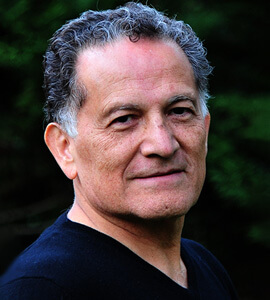
Edgar Sánchez-Sinencio (1944 – 2020)
Edgar, a friend of many, passed away on November 20, 2020 surrounded by his family in College Station, Texas. Edgar was a leader in the analog IC design community, a highly respected mentor to his students, and a role model for both colleagues and peers.
Edgar was born in Mexico City in 1944. He received a degree in Communications and Electronic Engineering from The National Polytechnic Institute of Mexico (IPN). Early in his career, he worked for The lnstituto Mexicano del Petroleo while studying advanced courses at IPN in the evenings to satisfy his insatiable curiosity of engineering. In 1970, Stanford University conferred on him the Master of Science degree. He obtained his Doctor in Philosophy degree from the University of Illinois in Champaign-Urbana for his thesis, Computer Aided Design of Microwave Circuits, in 1973. After receiving his doctoral degree, Edgar spent a year at the Central Research Laboratories of Nippon Electric Company as a postdoctoral researcher.
Upon his return to Mexico in 1974, he joined the Department of Electronics at the National Institute of Astrophysics Optics and Electronics (INAOE) in Tonantzintla, Puebla. At INAOE, Edgar founded the graduate program in the electronics field and promoted the creation of the Microelectronics Laboratory while serving as head of the department. The state-of-the art Microelectronics Laboratory was widely recognized in the field and provided unique opportunities for students and researchers throughout Latin America. In 1995, INAOE awarded Edgar the Honoris Causa Doctorate for his contributions in the analog integrated circuits field.
In 1983 Edgar became a professor of electrical engineering at Texas A&M University in College Station Texas, a position he held for 37 years along with the Texas Instruments’ Jack Kilby Chair. He served for many years as Director of the Analog and Mixed Signal Center and was recognized as a Texas A&M University Distinguished Professor in 2005.
Graduating 58 M.Sc. and 62 PhD students, Edgar was ever so proud of his students. Edgar authored and co-authored more than 400 scientific articles in refereed publications. He also authored and co-authored and edited various books, including Switched Capacitor Circuits, co-authored with Phillip Allen (1984), Low-Voltage/Low-Power Integrated Circuits and Systems, co-authored with Andreas Andreou (1999), and Artificial Neural Networks, co-authored with Clifford Lau (1992).
Edgar was a co-recipient of the Guillemin-Cauer Award (1995) for his work on cellular networks and the Darlington Award (1997) for his work on high-frequency filters. He was recipient of the Texas Senate Proclamation for Outstanding Accomplishments in 1996 followed by the IEEE Circuits and Systems Society Golden Jubilee Medal in 1999 and the IEEE Circuits and Systems Society Charles A. Desoer Technical Achievement Award in 2008.
Edgar was a proud IEEE Life Fellow and was elevated to fellow grade in 1992. He has served as a member of the Board of Governors of the IEEE Circuits and Systems Society (CASS) and as Vice President of Publications for CASS. He was Editor -in Chief of the IEEE Transactions on Circuits and Systems II: Express Briefs. He has also served as a Distinguished Lecturer of the CASS. On two occasions he served as General Chair/Co-Chair of the IEEE Midwest Symposium on Circuits and Systems. He was a life member of the Institution of Engineering and Technology (IET). Throughout his career, Edgar was active in a large number of professional activities across the globe including offering numerous workshops and lectures, serving on organizing committees of numerous conferences, serving as guest editor on timely publications, and engaging in numerous collaborative research and outreach programs. His efforts in Latin America and South America, in particular, have played a key role in increasing IEEE activities in these regions; and more recently, his efforts to establish ties with Ghana have resulted in a growth of CASS activities and new opportunities for students in Western Africa.
Edgar co-founded Vidatronic with his former student, Moises Robinson. Specializing in enhancing the efficiency and performance of electronic devices, Edgar served as the Chief Technology Officer of the company.
With the generous support and help from his friends, industry, and former students, the endowed Edgar Sanchez-Sinencio and Yolanda F. de Sanchez Chair was created at TAMU to support a faculty member in the Department of Electrical and Computer Engineering. A scholarship fund in his name has also been established.

Earl McCune (1956 – 2020)
It is with great sadness that we announce the sudden and untimely death of Earl McCune, IEEE Fellow (‘18) on May 27, 2020, in Santa Clara, California, USA. He was 63 and is survived by his wife, Barbara. At the time of his passing, Earl was a Professor of Delft University of Technology, the Netherlands, a tireless and long-time IEEE volunteer, as well as CTO and cofounder of Eridan Communications, Inc., California, USA. Earl’s longstanding passion for sustainable and energy-efficient radio frequency communications was an essential part of Eridan’s founding inspiration, and his colleagues are deeply saddened to lose his vision, steady leadership and generous spirit. That vision and commitment will also be missed by the IEEE communities that relied on his expertise in developing standards, guiding a roadmap for future network generations, or his willingness to provide necessary reality checks. Although Earl’s time at Delft was sadly cut short, the staff and students of the Microelectronics Department will always remember him for his boundless enthusiasm, humor and unselfish commitment to education and research in the field of wireless communication. His expertise and devotion to radio electronics—and equally importantly—his ability to bring all kinds of students, scientists and business people together, and inspire them with his ideas and dreams, will be greatly missed in Delft, in California, and by his many friends and collaborators around the world.
SSCS Establishes Educational Fund in Honor of Prof. James D. Meindl
The IEEE Solid-State Circuits Society (SSCS) working with a group of former students of Professor James Meindl has established the IEEE Solid-State Circuits Society James D. Meindl Memorial Educational Fund in honor of him. The fund will provide long-term support to enable SSCS to nurture, encourage, and celebrate students and early career innovators in the field of solid-state circuits. The Society intends to use the fund to support the establishment of a new award named for Professor Meindl that perpetuates his passions. The Award will celebrate accomplishments of young innovators and financially support the awardees to engage high school and undergraduate students through research projects related to integrated circuits technology. In addition to recognizing and encouraging the future leaders of SSCS, the Society would like the award to increase excitement about the solid-state circuits profession amongst young people.
Professor Meindl, a giant in the world of semiconductors and among the founding fathers of Silicon Valley, passed away on June 7, 2020. Prof. Meindl was an active member of the IEEE Solid-State Circuits Council, the predecessor of Society. He was a Past President of the Society, served as the founding editor of the IEEE Journal of Solid-State Circuits, and chaired the 1966 and 1969 International Solid-State Circuits Conference.
Professor Meindl had an infectious spirit and was passionate about nurturing future generations of solid-state circuits innovators. Mentoring over 90 Ph.D. candidates during his time at Stanford, RPI, and Georgia Tech, Prof. Meindl was a trusted confidante and had a profound impact on his students. He can rightly be said to be among the founding fathers of “Silicon Valley”, and the list of companies created by his students or those mentored by him is extensive.
Those interested in reading more about Professor Meindl’s legacy can click here. If you are interested in donating to Professor Meindl’s fund, you can do so through the IEEE Foundation.
If you have questions or wish to hold a personal consultation regarding the Fund or ways to contribute, please call +1 732-562-3915 or email .
A special section about Professor Meindl was in the Winter 2021 issue of the IEEE Solid-State Circuits Magazine. Please click here to read.
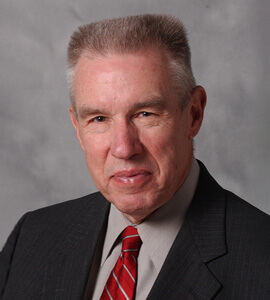
James D. Meindl (1933 – 2020)
James D. Meindl, our treasured friend, colleague and mentor passed away peacefully on June 7, 2020 at his home in Greensboro, Georgia after a long illness. He was 87 years old. Meindl was a giant in the world of semiconductors, a gentleman, and a leader of the highest magnitude.
Meindl was born in Pittsburgh, Pennsylvania and received his Ph.D., M.S., and B.S. degrees in 1958, 1956, and 1955, respectively, in electrical engineering at Carnegie Institute of Technology (now Carnegie-Mellon University). He was an outstanding leader in four distinct venues for 50-plus years.
From 1959-67, at the U.S. Army Electronics Laboratories (USAEL), Meindl worked with integrated circuits (ICs) – a field then barely six months old – and served consecutively as section leader, branch chief, and founding director of the Integrated Electronics Division consisted of 80 people, with responsibility for all USAEL R&D efforts in microelectronics. Meindl worked with early industry pioneers, who taught him about ICs, and he then began his own research, trying to figure out how to make an IC operate at a power level so low that it could be used inside a helmet as part of a radio receiver.
From 1967-1986, at Stanford University, Meindl served as founding director of the Integrated Circuits Laboratory, director of the Stanford Electronics Laboratories, associate dean for research in the School of Engineering, and founding co-director of the Center for Integrated Systems, which was a model for university and industry cooperative research in microelectronics.
While at Stanford, Meindl developed low-power integrated circuits and sensors for a portable reading aid for the blind, miniature wireless radio telemetry systems for biomedical research, and non-invasive ultrasonic imaging and blood-flow measurement systems that led directly to the medical systems in wide use today.
From 1986-1993, at Rensselaer Polytechnic Institute (RPI), he served as senior vice president for academic affairs and provost.
From 1993-2013, at Georgia Tech, Meindl joined the School of Electrical and Computer Engineering as the Joseph M. Pettit Chair Professor in Microsystems and served as the director of the Microelectronics Research Center (MiRC). He retired in 2013.
At Georgia Tech, Meindl was the MiRC director for 20 years, where he pursued work on different solutions for solving interconnectivity problems that arise from trying to interconnect billions of transistors within a tiny chip. Meindl was also the founding director of the SIA/DOD Interconnect Focus Center, leading a national team of more than 60 faculty members from the Massachusetts Institute of Technology, Stanford, RPI, Cornell University, SUNY-Albany, and Georgia Tech. In 2006, he became founding director of the Nanotechnology Research Center, the largest dual facility cleanroom in the southeastern United States, bringing together physical sciences and engineering and biological and biomedical nanotechnology research capabilities. His record of leadership in microelectronics and nanotechnology is unmatched.
Meindl published over 600 articles and four books, and he was issued 23 patents. From 1966-1971, he served as the founding editor of the IEEE Journal of Solid-State Circuits. He served in a leadership role on the IEEE Solid-State Circuits Council, the predecessor of the IEEE Solid-State Circuits Society, acting as President of the Council in 1972 and 1978. He also chaired the International Solid-State Circuits Conference (the world’s pre-eminent forum for integrated circuits) in 1966 and 1969. Meindl’s 90 Ph.D. graduates from Stanford, RPI, and Georgia Tech have had a profound impact on the semiconductor industry and on academia in many roles, including as corporate CEOs, university presidents, and deans. Among some of those Ph.D. graduates are past and current Stanford University faculty members, Jim Plummer (former dean of engineering), Krishna Saraswat, and Richard Swanson, M.I.T. President and faculty member Rafael Reif, Johns Hopkins former President William Brody and current Georgia Tech ECE faculty members Muhannad Bakir, Jeff Davis and Azad Naeemi. Even after graduation, alumni of his research groups considered Meindl as a trusted mentor they turned to when trying to make career and life decisions. He was also determined to pass on to his students his ability to see industry needs far into the future.
Meindl was a strong proponent of research with real world impact and promoted both an entrepreneurial spirit and sense of social responsibility among his students. He can rightly be said to be among the founding fathers of “Silicon Valley”, and the list of companies created by his students or those mentored by him is extensive. Among some of those companies are Cypress Semiconductor, Etron Technology, Lattice Semiconductor, Maxim Integrated Products, SanDisk, SunPower, Zoran and others.
Throughout his career, Meindl was a sought-after advisor or board member of several companies. Some of those companies include Hewlett Packard, IBM, Intel, SanDisk, US Venture Partners, Xerox, Zoran, and others. His extensive leadership and advisory roles in government and industry organizations include the Semiconductor Industry Association (SIA), Semiconductor Manufacturing Technology (SEMATECH), International Technology Roadmap for Semiconductors (ITRS), Interconnect Focus Center (IFC), NSF’s National Nanotechnology Infrastructure Network (NNIN), and others.
Meindl’s leadership and technical awards are many, but a short list includes the 2016 Sigma Xi Monie Ferst Award, the 2006 IEEE Medal of Honor, 2004 SRC Aristotle Award, 2001 Georgia Tech Class of 1934 Distinguished Professor Award, 2000 IEEE Third Millennium Medal, 1999 SIA University Research Award, 1991 ASEE Benjamin Garver Lamme Medal, and 1990 IEEE Education Medal. He was a member of the National Academy of Engineering, a Life Fellow of IEEE, Fellow of the American Association for the Advancement of Science, Eminent Member of Eta Kappa Nu, and a Life Member of Sigma Xi.
Meindl has made a significant and lasting impact on his students, faculty in several universities and many colleagues in the U.S. and around the world. We have been truly honored to have had Jim Meindl as our colleague, mentor, and friend.
This article is based on an original version written by Jackie Nemeth at the Georgia Institute of Technology with additional contributions from students and colleagues in academia and industry.
The IEEE Solid-State Circuit Society intends to establish a Fund in Professor James D. Meindl’s Memory. Further communication regarding the Fund will be posted in the future.



